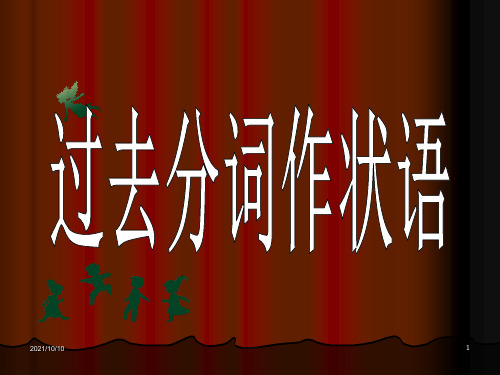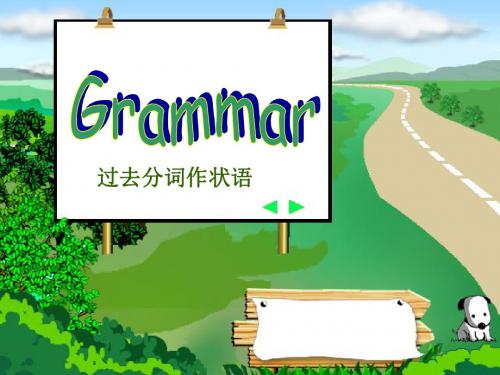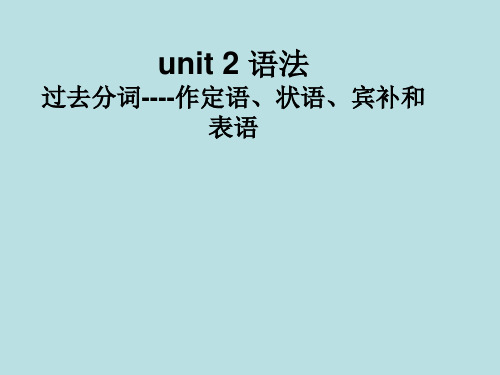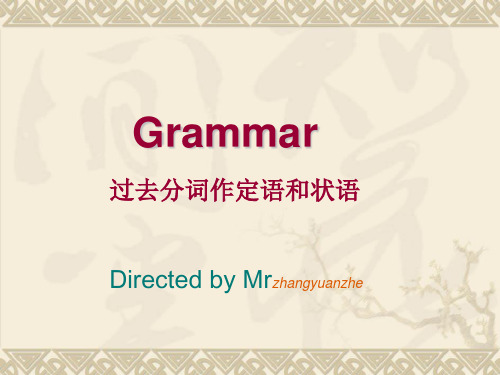过去分词做定语和状语精品PPT课件
合集下载
最新过去分词做状语精品ppt课件

=When he was asked what …, he kept silent. Given more time, we would be able to do the work
much better. 条件
=If we were given more time, we would … Left alone at home, the little boy didn’t feel afraid at
classroom. (Though) working from morning till night, his father didn’t get enough money.
Revision: 现在分词做状语
(When)Walking in the street, I came across an old friend of mine. 时间
Using your head, you will find a way. = If you use your head, you …
Working from morning till night, his father didn’t get enough money.
= Although his father worked from …, he sat on the sofa and watched TV
过去分词 做状语
注意:
1. Worried about the journey, I was unsettled for the first few days.
2. Exhausted, I slid into bed and fell fast asleep.
被动, 完成
状态
√
much better. 条件
=If we were given more time, we would … Left alone at home, the little boy didn’t feel afraid at
classroom. (Though) working from morning till night, his father didn’t get enough money.
Revision: 现在分词做状语
(When)Walking in the street, I came across an old friend of mine. 时间
Using your head, you will find a way. = If you use your head, you …
Working from morning till night, his father didn’t get enough money.
= Although his father worked from …, he sat on the sofa and watched TV
过去分词 做状语
注意:
1. Worried about the journey, I was unsettled for the first few days.
2. Exhausted, I slid into bed and fell fast asleep.
被动, 完成
状态
√
过去分词做状语讲解课件

02
过去分词做状语概述
定义和作用
定义
过去分词是一种动词的非谓语形式,它可以在句中担任状语 ,表示行为或状态在主句动作之前发生或存在。
作用
过去分词做状语可以丰富句子的表达方式,使句子更加简洁 、生动。
常见用法和例句
常见用法
过去分词做状语常常用来表示时间、条件、原因、伴随方式等。
例句
Given the opportunity, I would definitely pursue further studies.(如果有机会,我一定会继续深造。)其 中“given”为过去分词做状语,表示条件。
课程目标
帮助学生掌握过去分词做状语的用法,理解其结构和意义,能够在写作和口语 中正确使用。
教学计划和期望效果
教学计划
通过讲解、演示、练习和互动讨论等方式,让学生逐步掌握过去分词做状语的用 法。
期望效果
学生能够理解过去分词做状语的基本概念,掌握其用法规则,并在实际情境中运 用。同时培养学生的英语思维能力和语言表达能力。
与其他语法结构的区别
与现在分词做状语的区别
过去分词做状语表示动作或状态在主句动作之前发生 或存在,而现在分词做状语表示动作或状态与主句动 作同时发生或存在。例如,“Hearing the news, she burst into tears.”(听到消息,她突然大哭起来 。)中“hearing”为现在分词做状语。
识别过去分词做状语的条件
要识别一个过去分词是否可以作为状语,需要看它是否符合两个条件:一是与句子的主语 没有逻辑上的主谓关系;二是与句子的谓语动词所表示的动作没有时间上的先后关系。
制作解析表
为了更好地理解过去分词做状语的用法,可以制作一个解析表,列出不同的情况及其用法 。
过去分词做定语和状语课件

独立结构
独立结构指的是过去分词短语不依赖于任何从句,而是独立 地修饰名词或代词。这种结构通常表示一种状态或结果,强 调动作的完成。例如,“The broken window needs to be repaired.”(那个破碎的窗户需要被修理。)
独立结构有时也可以表示原因或条件,例如,“Given the limited time, we had to prioritize tasks.”(考虑到时间有 限,我们不得不优先处理任务。)
与其他定语形式的比较
与形容词做定语的区别
过去分词做定语主要表示被动动作或状 态,而形容词主要表示主动性质或状态。 例如,“the beautiful girl”中的 “beautiful”是形容词做定语,表示女 孩的性质是美丽的,而“the girl named Mary”中的“named”是过去分词做定 语,表示女孩的状态是被命名为Mary。
在省略结构中,过去分词短语可以省略掉某些成分,但必 须保证句子的完整性和清晰度。
05 练习与巩固
单项选题
总结词
考察基础概念
详细描述
提供多个包含过去分词做定语和状语的句子,要求选择正确的意思或符合语法规则的选项。
填空 题
总结词
应用实际语境
详细描述
根据句子语境,填入适当的过去 分词,使句子完整通顺。
结构辨析
过去分词做定语和状语在句子结构上 有所不同
过去分词做定语通常紧跟在修饰的名 词之后,而过去分词做状语则通常出 现在句首或句尾,修饰整个句子。
语境辨析
理解上下文语境对于区分过去分词做定语和状语至关重要
在阅读时,需要根据上下文语境来判断过去分词是作为定语还是状语,以准确理解句子的含义。
非谓语动词之分词作状语(公开课课件)PPT课件

分词短语作时间状语
表示分词的动作与句子主语的动作在 时间上有先后关系,如“Having finished his work, he went home.”
04
分词作状语的注意事项
分词作状语与从句的区别
分词作状语通常表示伴随、时 间、条件等关系,而从句则可 以表达更复杂的关系和意义。
分词作状语不具有主语和谓语, 而从句有主语和谓语。
详细描述
分词作状语通常紧跟在主语之后 ,表示主语执行的动作或状态的 方式、时间、条件、原因等,是 对主语动作或状态的补充说明。
分词作状语的种类
总结词
分词作状语可以分为现在分词作状语和过去分词作状语两种 。
详细描述
现在分词表示主语正在进行的动作或存在的状态,而过去分 词则表示主语已经完成的动作或存在的状态。
非谓语动词的用法
用作主语
例如,To learn English is important.(学习英 语很重要。)
用作宾语
例如,I like reading books.(我 喜欢读书。)
用作表语
例如,The problem is to find a solution.(问题在于 找到一个解决方案。)
分词作状语的特殊用法
分词短语作伴随状语
分词短语作条件状语
表示分词的动作与句子主语的动作同 时发生,如“He left, accompanied by his secretary.”
表示分词的动作与句子主语的动作在 条件上有因果关系,如“Given more time, they could have done better.”
练习一
请将下列句子中的分词转换为适 当的状语从句。
句子
Hearing the news, she jumped with joy.
高中英语过去分词作状语课件(共24张PPT)

• Know about its different functions as Adverbial.
• 了解过去分词作状语的不同功能及 位置
观察下列句子,确定过去分词(短语)在句中做何种状语
1. Asked why he didn’t do it, he begin to cry.
(时间状语)
2. Given more time, I will catch up with you. (条件状语)
完成句子 1. Asked what had happened, he told us about it.
→W__h_e_n_ __h_e__ w__a_s__a_sk__ed___what had happened,
he told us aboid not feel afraid at all.
his study. →Although he was laughed at by many people, he….
结构:连词+句子主语+系动词(注意时态)+过去分词
作伴随状语或方式状语则转换为并列结构的句子
Aunt Wu came in, followed by her daughter. = Aunt Wu came in, and she was followed by her
Working hard, a×nd you’ll catch up with me.
Work hard, and you’ll catch up with me.
If you work hard, you’ll ….
Decide T or F
﹨ Exhausted, so I slid into bed and fell fast asleep. ×
• 了解过去分词作状语的不同功能及 位置
观察下列句子,确定过去分词(短语)在句中做何种状语
1. Asked why he didn’t do it, he begin to cry.
(时间状语)
2. Given more time, I will catch up with you. (条件状语)
完成句子 1. Asked what had happened, he told us about it.
→W__h_e_n_ __h_e__ w__a_s__a_sk__ed___what had happened,
he told us aboid not feel afraid at all.
his study. →Although he was laughed at by many people, he….
结构:连词+句子主语+系动词(注意时态)+过去分词
作伴随状语或方式状语则转换为并列结构的句子
Aunt Wu came in, followed by her daughter. = Aunt Wu came in, and she was followed by her
Working hard, a×nd you’ll catch up with me.
Work hard, and you’ll catch up with me.
If you work hard, you’ll ….
Decide T or F
﹨ Exhausted, so I slid into bed and fell fast asleep. ×
高中英语语法——过去分词作状语(32张PPT)-经典通用课件资料

2021/10/10
9
The film star appeared, surrounded by a group of fans. =The film star appeared and was surrounded by a group of fans.
2021/10/10
10
用括号内所给动词的适当形式填空。
2021/10/10
7
4. 表示让步 表示让步,相当于although/though引导的让步状语从句.
ughed at by many people, he continued his study. 2.Badly wounded, he continued to fight.
Though he was laughed at by many people, he continued his study. Though he was badly wounded, he continued to fight.
2021/10/10
20
7. 现在分词、过去分词和不定式作状语的区别
2021/10/10
3
ห้องสมุดไป่ตู้
1.过去分词作时间状语
1. Seen under a microscope, a fresh snowflake has a delicate (精美的) shape. When it is seen under a microscope, a fresh snowflake(雪花) has a delicate shape.
3.Given good weather, our ship will reach Shanghai this evening. 假如天气好,我们的船将于今晚抵达上海。
过去分词作状语 专题课件(共34张PPT)

重难点辨析(二):不表被动的特殊情况 注意:
1. Worried about the journey, I was unsettled for the first few days. 2. Exhausted, I slid into bed and fell fast asleep.
被动, 完成
⑤ The old man went into the room, supported by his wife. (伴随或方式状语)
5.过去分词+连词 过去分词作状语,常常可以在过去分词前加 连词(when, if, though, once 等),以起到强 调的作用,使句意更加明确。
6. 过去分词状语,相当于一个状语从句。 (伴随状语相当于一个并列句)
一般地(坦率地/确切地)说; Considering… 考虑到……; Talking of… 说到….;
Supposing/ Provided/ Providing that… 假使….; To be honest, /To tell the truth, 老实说;说实话
______ from his accent, he must come from southern China. A. Judged; B. Judging ; C. To judge D. Judge
流连忘返
Revision: 现在分词做状语
一.过去分词作状语的基本用法: 被动 1. 过去分词与句子主语之间构成_______ 关系。
2. 过去分词的逻辑主语要和句子的主语一致。
3. 可置于主句前,也可置于主句后,用逗号与主句隔开。 4. 过去分词通常在句中充当以下几种状语:
① (When) Asked what had happened, he kept silent. (时间状语)
《过去分词作状语定》课件

Surrounded By
Sitting at his desk, he was surrounded by piles of paperwork.
总结和应用技巧
过去分词作状语是表达时间、原因、结果和伴随关系的常用方式,根据语法规则灵活运用可提升语言表 达的多样性和流畅度。
过去分词作状语的语法规则
1 时间关系
表示时间顺序或先后关 系,如Once finished, she left.
2 原因关系
表示原因或结果,如 Being tired, he went to bed early.
3 方式关系
表示伴随状况,如He walked into the room, followed by his dog.
《过去分词作状语定》 PPT课件
本课件将介绍《过去分词作状语定》,包括过去分词的定义、作为状语的语 法规则以及其在时间、原因、结果和伴随状语中的应用。
什么是过去分词
形式以-edຫໍສະໝຸດ -en结尾的动词形 式,表示被动或完成的动 作。
功能
作状语、定语或补语,强 调动作发生在主语之前。
例子
broken, written, seen, eaten, taken
过去分词作结果状语
Achieve Happiness
Happily married, they set off on their honeymoon.
Face Consequences
Fired from his job, he struggled to find a new one.
Obtain Success
Studying hard, she earned top scores on her exams.
Sitting at his desk, he was surrounded by piles of paperwork.
总结和应用技巧
过去分词作状语是表达时间、原因、结果和伴随关系的常用方式,根据语法规则灵活运用可提升语言表 达的多样性和流畅度。
过去分词作状语的语法规则
1 时间关系
表示时间顺序或先后关 系,如Once finished, she left.
2 原因关系
表示原因或结果,如 Being tired, he went to bed early.
3 方式关系
表示伴随状况,如He walked into the room, followed by his dog.
《过去分词作状语定》 PPT课件
本课件将介绍《过去分词作状语定》,包括过去分词的定义、作为状语的语 法规则以及其在时间、原因、结果和伴随状语中的应用。
什么是过去分词
形式以-edຫໍສະໝຸດ -en结尾的动词形 式,表示被动或完成的动 作。
功能
作状语、定语或补语,强 调动作发生在主语之前。
例子
broken, written, seen, eaten, taken
过去分词作结果状语
Achieve Happiness
Happily married, they set off on their honeymoon.
Face Consequences
Fired from his job, he struggled to find a new one.
Obtain Success
Studying hard, she earned top scores on her exams.
Unit2语法-过去分词作定语、表语、宾补、状语课件课件-高中英语人教版(2019)选择性必修第四册

难点突破: V-ed和V-ing形式作表语的区别?
1. The result of the final English test was
rather __d_i_s_a_p_p_o_i_n_t_i.ng
He was very _d_isapp__o_in_ ted at the result
of the final test. ( disappoint ) 2. The _f_r_ig_h_t_e_n_i_n_g___man with an ugly black
(Ved)
1. From her _______ look, I knew she was
unsatisfied.
A. disappointing B. disappoints
C. to disappoint
D. disappointed
2. Hearing the tiger's _______ voice, she was so ___________. A. scared, scared B. scared , scaring C. scaring, scared D. scaring, scaring
3. 形容词化的过去分词:
_a_m__a_z_e_d_,_s_u_r_p_ri_s_e_d_,___________ _s_c_a_r_e_d_,_w__o_rr_i_ed__, _d_is_a_p_p_o_i_n_t_e_d_, _ _e_x_c_i_te_d__, _d_e_li_g_h_te_d_,__p_le_a_s_e_d__, ___ __s_at_i_s_fi_e_d_, _m_o_v_e_d_,_d_e_v_o__te_d_,_.._. ___
知识点——过去分词(短语)做状语和定语PPT课件

过去分词(短语)做状语和定语 【典型例题】
1. The park ___ life in the days of King Arthur is one of the main
__ of the city.
A. modeling after, attraction B. is modeled after, attractions
D.
过去分词(短语)做状语和定语 【典型例题】
2. _____ to his work, the scientist didn’t get married all his life.
A. Devoted
B. Devoting
C. Devote
D. To devote
答案:A
解析:考查非谓语动词。句意为:由于专注于工作,那位科学
一、过去分词(短语)作状语 过去分词(短语)作状语,表示谓语动词的动作发生的背 景或情况,表示的动作是主语动作的一部分,与谓语表示 的动作或状态几乎是同时发生,或是先于谓语动词的动作 发生,它的逻辑主语与句子的主语一致。过去分词作状语 一般都用逗号同其它成分隔开,在意义上相当于一个时间 状语从句。过去分词(短语)作状语可以表示时间、原因、 条件、让步、方式、伴随等。
Learning Is To Achieve A Certain Goal And Work Hard, Is A Process To Overcome Various Difficulties For A Goal
过去分词(短语)做状语和定语 【知识点解析】
4.作方式或伴随状语时,一般不能用状语从句替换, 但可以转换成并列分句或非限制性定语从句,可 位于句首或句尾。例如: Surrounded by his students, the professor sat there cheerfully. (= The professor was surrounded by his students and sat there cheerfully.)
过去分词做定语和状语优秀课件

a computer can be lower than store
prices.(2002春招)
A. are bought
B. bought
B.C. been bought D. buying
过去分词作定语与其它非谓语形式的 区别: 1. 过去分词done表示被动和完成; 2. 现在分词的主动式doing表示主动的、 正在进行的动作; 3. 现在分词的被动式being done表示被动 的、正在进行的动作; 4. 不定式的主动式to do表示一个将要发生 的主动动作; 5. 不定式的被动式to be done则表示一个 将要发生的被动动作
▪ 6. The vehicle mentioned in the book is unknown to me.
▪ 7. The castle built in 1432 is under repair.
状语(adverbial)是修饰动词,副词,形容词或 整个句子的,常由副词或相当于副词的短语或 从句担任,修饰动词时,可置于动词之前,亦 可置于动词之后;修饰形容词或副词时,常置 于它们之前。可分为时间状语,地点状语,方 式状语,程度状语,目的状语,原因状语,结 果状语,条件状语,让步状语,频率状语等。 例如:
1.Tom runs quickly. 2.The book is well worth reading. 3.He gets up at five every morning. 时间状语 4.The boys are playing on the playground.
▪ 3. Now combine these two sentences using the past participle as the attribute.
过去分词作定语和状语

❖ 2.Unless _A___ to speak, you should
remain silent at the conference. A.invited B.inviting C.being invited D.having invited
❖ 3.(上海春2002)When _A___,the museum will
fallen leaves落叶 faded flowers凋谢的花
Function----practice (3m)
❖ 1. The programs _p_u_t_ (put) on yesterday evening were really wonderful.
❖ 2. S__e_n_t (send) to the hospital immediately, the wounded soldier was saved.
❖ ==As his parents`company,called”future tours” was wellknown for their expertise,it transported me safely into the future in a time capsule.
❖ 2.Hit by a lack of fresh air ,my head ached. ❖ ==As my head was hit by a lack of fresh air ,it ached. ❖ 3.Exhausted,I slid into bed and fell fast asleep. ❖ ==As I was exhausted, I slid into bed and fell fast asleep.
Grammar
过去分词作定语和状语
remain silent at the conference. A.invited B.inviting C.being invited D.having invited
❖ 3.(上海春2002)When _A___,the museum will
fallen leaves落叶 faded flowers凋谢的花
Function----practice (3m)
❖ 1. The programs _p_u_t_ (put) on yesterday evening were really wonderful.
❖ 2. S__e_n_t (send) to the hospital immediately, the wounded soldier was saved.
❖ ==As his parents`company,called”future tours” was wellknown for their expertise,it transported me safely into the future in a time capsule.
❖ 2.Hit by a lack of fresh air ,my head ached. ❖ ==As my head was hit by a lack of fresh air ,it ached. ❖ 3.Exhausted,I slid into bed and fell fast asleep. ❖ ==As I was exhausted, I slid into bed and fell fast asleep.
Grammar
过去分词作定语和状语
- 1、下载文档前请自行甄别文档内容的完整性,平台不提供额外的编辑、内容补充、找答案等附加服务。
- 2、"仅部分预览"的文档,不可在线预览部分如存在完整性等问题,可反馈申请退款(可完整预览的文档不适用该条件!)。
- 3、如文档侵犯您的权益,请联系客服反馈,我们会尽快为您处理(人工客服工作时间:9:00-18:30)。
▪ 6. The vehicle mentioned in the book is unknown to me.
▪ 7. The castle built in 1432 is under repair.
状语(adverbial)是修饰动词,副词,形容词或 整个句子的,常由副词或相当于副词的短语或 从句担任,修饰动词时,可置于动词之前,亦 可置于动词之后;修饰形容词或副词时,常置 于它们之前。可分为时间状语,地点状语,方 式状语,程度状语,目的状语,原因状语,结 果状语,条件状语,让步状语,频率状语等。 例如:
--No. But I will attend the one _A____
tomorrow.
A. to be held
B. having been held
C. held
D. being held
2. Do you know the name of the play_B__ in
the hall now?
a computer can be lower than store
prices.(2002春招)
A. are bought
B. bought
B.C. been bought D. buying
过去分词作定语与其它非谓语形式的 区别: 1. 过去分词done表示被动和完成; 2. 现在分词的主动式doing表示主动的、 正在进行的动作; 3. 现在分词的被动式being done表示被动 的、正在进行的动作; 4. 不定式的主动式to do表示一个将要发生 的主动动作; 5. 不定式的被动式to be done则表示一个 将要发生的被动动作
B. writing
C. was written
D. to write
4. Please don’t forget him. He is one of
___A____.
A. those invited
B. invited those
C. those inviting
inviting those
__h_e_ld___ yesterday
The meeting _b_e_i_n_g__h_e_ld__ now (hold) _t_o_b_e__h_e_ld__ tomorrow
is of great importance. (hold)
1. Did you attend the meeting___C__ yesterday?
和分 状词 语做
定 语
定语(attributive)是限定或修饰名词或相当于名词 的词的,常由形容词或相当于形容词的短语或从 句担任。根据与所修饰的词之间的位置关系可分 为前置定语和后置定语。例如:
1.The red and big apple in mine. 2. There are many fallen leaves on the ground. 3. The piano used by the teacher is very good. 4.Children living by the sea usually begin to swim at an early age. 5.Li Lei’s written English isn’t as good as his spoken English.
1.Tom runs quickly. 2.The book is well worth reading. 3.He gets up at five every morning. 时间状语 4.The boys are playing on the playground.
There are some sentences from the reading passage with the past participle used as the attribute:
▪ 1. … his parents’ company named “Future Tours” transported me safely into …
A. to be put on
B. being put on
C. put on
D. putting on
3. I borrowed a book ___A___ by Mark Twain
from the library last week. I like it very
much.
A. written
一、作定语
动词的过去分词作定语时表示动作 的被动和完成,单独及物动词的过 去分词一般置于被修饰名词前,而 过去分词短语则要位于名词之后。
The lost child was found at last. The child lost in the park was found at last.
Prices of daily goods _____through
(Line 5, Para1, Page 18) ▪ 2. Tomorrow you will be ready for some
visits organized by the company.
(The last but two line, Para4, Page 18)
Finish Ex3 on P21
▪ 3. I like the old private house built of wood and mud.
▪ 4. The room connected to the rest of the house by a long passage is completely empty.
▪ 5. The queen was sitting in a royal carriage drawn by four horses.
▪ 3. Now combine these two sentences using the past participle as the attribute.
▪ 1. Soon we lost sight of that famous astronomer called Li Qiang.
▪ 2. I am going to buy a painting copied from Vincent van Gogh.
▪ 7. The castle built in 1432 is under repair.
状语(adverbial)是修饰动词,副词,形容词或 整个句子的,常由副词或相当于副词的短语或 从句担任,修饰动词时,可置于动词之前,亦 可置于动词之后;修饰形容词或副词时,常置 于它们之前。可分为时间状语,地点状语,方 式状语,程度状语,目的状语,原因状语,结 果状语,条件状语,让步状语,频率状语等。 例如:
--No. But I will attend the one _A____
tomorrow.
A. to be held
B. having been held
C. held
D. being held
2. Do you know the name of the play_B__ in
the hall now?
a computer can be lower than store
prices.(2002春招)
A. are bought
B. bought
B.C. been bought D. buying
过去分词作定语与其它非谓语形式的 区别: 1. 过去分词done表示被动和完成; 2. 现在分词的主动式doing表示主动的、 正在进行的动作; 3. 现在分词的被动式being done表示被动 的、正在进行的动作; 4. 不定式的主动式to do表示一个将要发生 的主动动作; 5. 不定式的被动式to be done则表示一个 将要发生的被动动作
B. writing
C. was written
D. to write
4. Please don’t forget him. He is one of
___A____.
A. those invited
B. invited those
C. those inviting
inviting those
__h_e_ld___ yesterday
The meeting _b_e_i_n_g__h_e_ld__ now (hold) _t_o_b_e__h_e_ld__ tomorrow
is of great importance. (hold)
1. Did you attend the meeting___C__ yesterday?
和分 状词 语做
定 语
定语(attributive)是限定或修饰名词或相当于名词 的词的,常由形容词或相当于形容词的短语或从 句担任。根据与所修饰的词之间的位置关系可分 为前置定语和后置定语。例如:
1.The red and big apple in mine. 2. There are many fallen leaves on the ground. 3. The piano used by the teacher is very good. 4.Children living by the sea usually begin to swim at an early age. 5.Li Lei’s written English isn’t as good as his spoken English.
1.Tom runs quickly. 2.The book is well worth reading. 3.He gets up at five every morning. 时间状语 4.The boys are playing on the playground.
There are some sentences from the reading passage with the past participle used as the attribute:
▪ 1. … his parents’ company named “Future Tours” transported me safely into …
A. to be put on
B. being put on
C. put on
D. putting on
3. I borrowed a book ___A___ by Mark Twain
from the library last week. I like it very
much.
A. written
一、作定语
动词的过去分词作定语时表示动作 的被动和完成,单独及物动词的过 去分词一般置于被修饰名词前,而 过去分词短语则要位于名词之后。
The lost child was found at last. The child lost in the park was found at last.
Prices of daily goods _____through
(Line 5, Para1, Page 18) ▪ 2. Tomorrow you will be ready for some
visits organized by the company.
(The last but two line, Para4, Page 18)
Finish Ex3 on P21
▪ 3. I like the old private house built of wood and mud.
▪ 4. The room connected to the rest of the house by a long passage is completely empty.
▪ 5. The queen was sitting in a royal carriage drawn by four horses.
▪ 3. Now combine these two sentences using the past participle as the attribute.
▪ 1. Soon we lost sight of that famous astronomer called Li Qiang.
▪ 2. I am going to buy a painting copied from Vincent van Gogh.
